The conference “Syrian Women Building the Future” in Vienna on the 6th and 7th of October gathered Syrian women activists, lawyers, and researchers from Europe and Syria (via Zoom) to network and reflect on the achievements and challenges of Syrian activism in Europe over the past few years. The conference kicked off with a public panel discussion at the Karl Renner Institute.
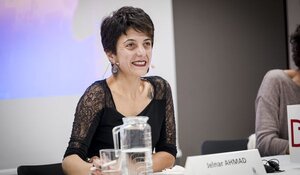
There are many global crises facing and affecting all countries, from wars and disease outbreaks to economic crises and famines. In Syria, they are all accompanied by general political ambiguities and the lack of a horizon for an early solution. This conference was an important step in creating safe spaces and channels for communication between effective and important parts of Syrian society in Europe. Jelnar Ahmed described this event as an "important opportunity for meetings and discussions, as the need for communication and networking, as well as building support and solidarity networks, is more important now than ever."
"The quota of 30% women's political participation has never been achieved."
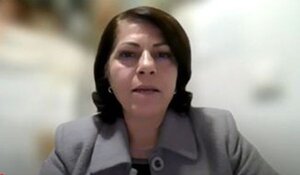
To this day, Syrian women have been the first to work in political and civil affairs despite their systematic obstacles, such as marginalization and exclusion from public spaces. This reality is linked to traditional gender roles relating to women in Syrian society and the patriarchal system that prevents women from taking their full role in shaping and leading politics in Syria. However, since the beginning of the last century, the presence of Syrian women in political affairs has enhanced the image of active Syrian women and has given us a push for the future. Political activist Sabiha Khalil outlined the political participation of Syrian women in opposing bodies and organizations: “It is still very limited and does not meet the needs and aspired roles that women are trying to fill in this field.” Despite the increased efforts of women and UN organisations to enhance women’s political participation, the quota of 30% has never been achieved. The Women Advisory Board was created to advise the office of the UN-Special envoy to Syria regarding the peace talks that take place in Geneva. Therefore, it is essential for women to be represented and act as decision-makers and take their share of power.
"Only 4% of the funding goes to projects related to women's issues "
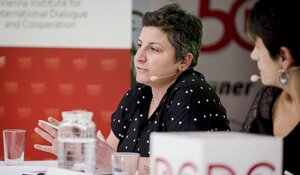
Within the context of the Syrian civil society in Europe, there are many challenges facing women. Most importantly, according to Ruham Hawash, the absence of prospect and strategic planning by donors who can support the plans and projects of women and their institutions in a way that ensures continuity and enhances the accumulation of knowledge and experiences for women. Donors tend to design temporary support programs and provide funding for topics that fall outside the strategic plans of organizations working in civil affairs and focus on something other than women's projects and issues. “In the research we published, we found that only 4% of the funding directed to Syrian civil society organizations goes to projects related to women's issues and this is a shameful percentage.” These challenges are not only related to funding but also to access and ensuring continuity despite the difficulties of organizing in the diaspora and the restrictions on projects being implemented inside Syria.
"Knowledge is power, and power is what we must have to lead the change."
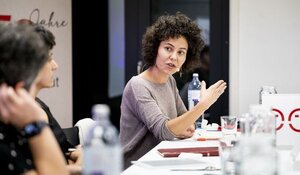
In her contribution, Ola Ramadan highlighted the importance of knowledge production: "Knowledge is power, and power is what we must have to lead the change." Ramadan sought to give an in-depth analysis of the nature of the Syrian struggle in recent years and how the methods of resistance in Syria have changed and transformed. The early phases of the revolutionary movement in Syria were characterised by an emphasis on purely political demands for freedom and dignity and a change in the political system as a revolutionary solution. The focus, especially for women and feminists, has now turned towards long-term solutions that could pave the way for comprehensive social change, which began with the start of the revolutionary movement and will continue until the desired aspirations are achieved. This is where the importance of knowledge production and initiatives to preserve oral history and document images of struggles come into play. It is essential to politicise daily action and redefine political activity to connect it to the reality of women and individuals in their plans and projects. "These projects, which aim to preserve oral history, are almost exclusively led by women and are the least funded and supported.” Thus, it is essential to create spaces to think about alternative methods of funding and make it possible for women to meet for the sake of communicating, creating, and enabling.
“Women must be involved in the planning and implementation stages of projects and activities."
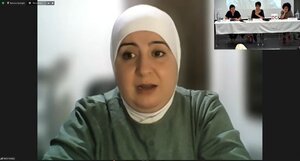
The challenges of women living in Syria are different and have been changing through the years due to the complex and dynamic nature of the Syrian conflict. During the peaceful uprising, women organized and led demonstrations and sit-ins hand-in-hand with men. Later, the uprising turned into an armed conflict that restricted everyone’s freedom of demonstration, put women under more pressure during the sieges, and brutal military operations were used against civilians. At the same time, forces with extremist Islamic backgrounds came to power in the areas outside the control of the regime, which made women's participation in public life almost impossible. This also exposed women to numerous violations and crimes directed against them purely because of misogynistic attitudes toward women. Women’s roles and participation in the struggle also varied and sometimes were limited to education and health due to the reality of the siege. Still, it was essential to ensuring the continuity of society as a whole. Even the control of ISIS for a period of time negatively affected the status of women, and this situation is still palpable even today after the end of ISIS control.
Today, women activists in civil society organizations in Syria are subjected to systematic attacks and hate speech intending to restrict their work with pretexts such as the priority of other issues and the need to focus on relief, education, and nutrition, rather than issues of supporting and empowering women.
Nevin Alhoutary from Syria gave influential input and delivered clear and strong messages about the need to increase communication and build support networks to help and support Syrian women, whether by providing platforms for participation or by providing support through experiences. According to Alhoutary, it is necessary to build and design projects based on a real need that simulates the reality of Syrian women and refrain from exporting solutions that do not directly serve to solve the basic problems faced by women. There is a need to understand and analyse the context more broadly, especially within Syria in the liberated north. “Therefore, women must be involved in the planning and implementation stages of projects and activities, and not only as beneficiaries.”

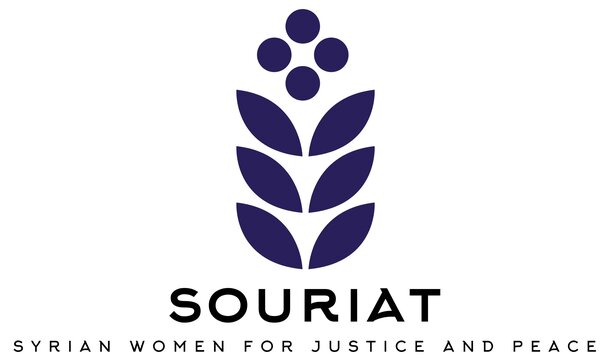
![[Translate to English:] Konferenzteilnehmerinnen](https://www.vidc.org/fileadmin/user_upload/konferenzteilnehmerinnen_%40karo_pernegger-79.jpg)
![[Translate to English:] Panel](https://www.vidc.org/fileadmin/user_upload/panel_6.10.%40karo_pernegger_600x350.jpg)
![[Translate to English:] Magda Seewald](https://www.vidc.org/fileadmin/user_upload/magda_seewald%40karo_pernegger_600x350.jpg)
![[Translate to English:] Jelnar Ahmad](https://www.vidc.org/fileadmin/user_upload/jelnar_ahmad%40karo_pernegger_600x350.jpg)
![[Translate to English:] Oula Ramadan](https://www.vidc.org/fileadmin/user_upload/oula_ramadan%40karo_pernegger_600x350.jpg)
![[Translate to English:] Nivin Alhotary](https://www.vidc.org/fileadmin/_processed_/b/6/csm_nivin_alhotary_600x350_1300431a50.jpg)
![[Translate to English:] Sabiha Khalil](https://www.vidc.org/fileadmin/user_upload/sabiha_khalil%40karo_pernegger_600x350.jpg)
![[Translate to English:] Ruham Hawash](https://www.vidc.org/fileadmin/user_upload/ruham_hawash%40karo_pernegger_600x350.jpg)
![[Translate to English:] Publikum](https://www.vidc.org/fileadmin/user_upload/publikum6.10.%40karo_pernegger_600x350.jpg)
![[Translate to English:] Oula Ramadan](https://www.vidc.org/fileadmin/user_upload/oula_ramadan1%40karo_pernegger_600x350.jpg)
![[Translate to English:] Ruham Hawash](https://www.vidc.org/fileadmin/user_upload/ruham_hawash1%40karo_pernegger_600x350.jpg)
![[Translate to English:] Abir Hajibrahim](https://www.vidc.org/fileadmin/user_upload/abir_hajibrahim%40karo_pernegger_600x350.jpg)
![[Translate to English:] Amneh Khoulani](https://www.vidc.org/fileadmin/user_upload/amneh_khoulani%40karo_pernegger_600x350.jpg)